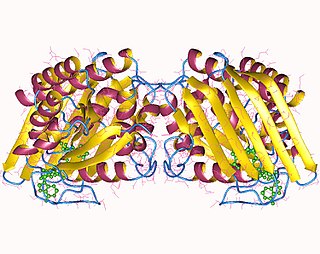Aldo-keto reductase family 7 member A3 is a protein that in humans is encoded by the AKR7A3 gene. [3]
Aldo-keto reductase family 7 member A3 is a protein that in humans is encoded by the AKR7A3 gene. [3]
Aldo-keto reductases, such as AKR7A3, are involved in the detoxification of aldehydes and ketones.[supplied by OMIM, Apr 2004].

In enzymology, aldose reductase is a cytosolic NADPH-dependent oxidoreductase that catalyzes the reduction of a variety of aldehydes and carbonyls, including monosaccharides. It is primarily known for catalyzing the reduction of glucose to sorbitol, the first step in polyol pathway of glucose metabolism.

Sepiapterin reductase is an enzyme that in humans is encoded by the SPR gene.

Aldo-keto reductase family 1, member B1 (AKR1B1), also known as aldose reductase, is an enzyme that is encoded by the AKR1B1 gene in humans. It is a reduced nicotinamide-adenine dinucleotide phosphate (NADPH)-dependent enzyme catalyzing the reduction of various aldehydes and ketones to the corresponding alcohol. The involvement of AKR1B1 in oxidative stress diseases, cell signal transduction, and cell proliferation process endows AKR1B1 with potential as a therapeutic target.

Aldo-keto reductase family 1 member C3 (AKR1C3), also known as 17β-hydroxysteroid dehydrogenase type 5 is a key steroidogenic enzyme that in humans is encoded by the AKR1C3 gene.

Aldo-keto reductase family 1 member C1 also known as 20α-hydroxysteroid dehydrogenase, 3α-hydroxysteroid dehydrogenase, and dihydrodiol dehydrogenase 1/2 is an enzyme that in humans is encoded by the AKR1C1 gene.

Alcohol dehydrogenase [NADP+] also known as aldehyde reductase or aldo-keto reductase family 1 member A1 is an enzyme that in humans is encoded by the AKR1A1 gene. AKR1A1 belongs to the aldo-keto reductase (AKR) superfamily. It catalyzes the NADPH-dependent reduction of a variety of aromatic and aliphatic aldehydes to their corresponding alcohols and catalyzes the reduction of mevaldate to mevalonic acid and of glyceraldehyde to glycerol. Mutations in the AKR1A1 gene has been found associated with non-Hodgkin's lymphoma.

3α-Hydroxysteroid dehydrogenase is an enzyme that in humans is encoded by the AKR1C4 gene. It is known to be necessary for the synthesis of the endogenous neurosteroids allopregnanolone, THDOC, and 3α-androstanediol. It is also known to catalyze the reversible conversion of 3α-androstanediol (5α-androstane-3α,17β-diol) to dihydrotestosterone and vice versa.

Olfactory receptor 10J5 is a protein that in humans is encoded by the OR10J5 gene.

Aldo-keto reductase family 1 member B10 is an enzyme that in humans is encoded by the AKR1B10 gene.

Aflatoxin B1 aldehyde reductase member 2 is an enzyme that in humans is encoded by the AKR7A2 gene.

Thioredoxin reductase 1, cytoplasmic is an enzyme that in humans is encoded by the TXNRD1 gene.

The aldo-keto reductase family is a family of proteins that are subdivided into 16 categories; these include a number of related monomeric NADPH-dependent oxidoreductases, such as aldehyde reductase, aldose reductase, prostaglandin F synthase, xylose reductase, rho crystallin, and many others.

5α-Dihydroprogesterone is an endogenous progestogen and neurosteroid that is synthesized from progesterone. It is also an intermediate in the synthesis of allopregnanolone and isopregnanolone from progesterone.

Aldehyde dehydrogenase 8 family, member A1 also known as ALDH8A1 is an enzyme that in humans is encoded by the ALDH8A1 gene.

Aldehyde dehydrogenase 3 family, member B1 also known as ALDH3B1 is an enzyme that in humans is encoded by the ALDH3B1 gene.
Perakine reductase (EC 1.1.1.317) is an enzyme with systematic name raucaffrinoline:NADP+ oxidoreductase. This enzyme catalyses the following chemical reaction

Dehydrogenase/reductase member 7 is a protein that in humans is encoded by the DHRS7 gene.

Biliverdin reductase A is a protein that in humans is encoded by the BLVRA gene.

Aldo-keto reductase family 1 (AKR1) is a family of aldo-keto reductase enzymes that is involved in steroid metabolism. It includes the AKR1C and AKR1D subgroups, which respectively consist of AKR1C1–AKR1C4 and AKR1D1. Together with short-chain dehydrogenase/reductases (SDRs), these enzymes catalyze oxidoreductions, act on the C3, C5, C11, C17 and C20 positions of steroids, and function as 3α-HSD, 3β-HSDs, 5β-reductases, 11β-HSDs, 17β-HSDs, and 20α-HSDs, respectively. The AKR1C enzymes act as 3-, 17- and 20-ketosteroid reductases, while AKR1D1 acts as the sole 5β-reductase in humans.

Aldo-keto reductase family 1 member C2, also known as bile acid binding protein, 3α-hydroxysteroid dehydrogenase type 3, and dihydrodiol dehydrogenase type 2, is an enzyme that in humans is encoded by the AKR1C2 gene.
This article incorporates text from the United States National Library of Medicine, which is in the public domain.
| | This article on a gene on human chromosome 1 is a stub. You can help Wikipedia by expanding it. |